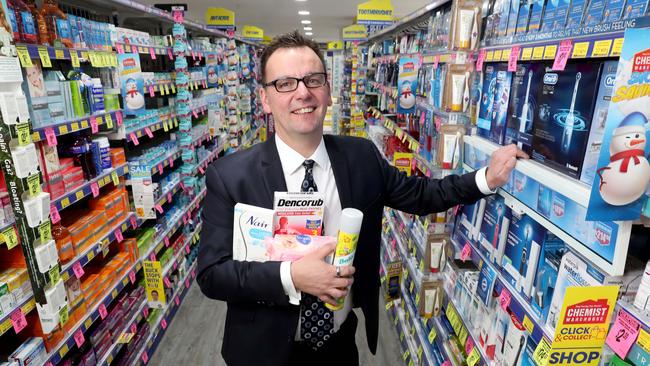Virus sparks boom in home beauty treatments
The coronavirus pandemic that saw panic-shopping at supermarkets and chemists and forced the closure of beauty salons has triggered a sales boom for home beauty treatments.

The coronavirus pandemic that saw panic-shopping at supermarkets and chemists and forced the closure of beauty salons has triggered a sales boom for home beauty treatments such as hair removal products, baby wipes and in recent weeks pregnancy tests, says Church & Dwight chief executive David Thomas.
The boss of Church & Dwight Australia and New Zealand, an offshoot of the US company that owns consumer brands Curash, First Response pregnancy tests, Nair hair removal and pain relief ointment Dencorub, said some of his leading products had booked 50 per cent sales growth since the coronavirus outbreak in March.
Mr Thomas told The Australian that demand was strong across the supermarket aisles and within pharmacies as consumers filled their pantries with his stable of products, particularly baby wipes and Church & Dwight’s hair removal brands.
“We started off the year particularly well prior to COVID, so we made a very good start with just organic growth, and then we saw COVID trigger growth in March and April across a number of our categories,’’ Mr Thomas said.
“Both pharmacy and grocery saw consumption increases in retailers, and so our baby wipes went particularly well and our hair removal product Nair did really well. We had our pregnancy test kits start to go up after COVID in April and May.”
According to documents lodged with the corporate regulator, Church & Dwight posted a slight increase in revenue to $82.65m in calendar 2019 from $80.23m in 2018 as profit dipped to $8.7m from $9.2m.
In March and April, consumers stripped supermarket shelves of products ranging from toilet paper and hand sanitisers to rice and pasta. Personal care products were also popular, with anything linked to cleaning and hygiene particularly attractive.
This seemed to have also driven demand for baby wipes, as there was a significant leap in sales of Church & Dwight’s key baby products, despite there being no similar jump in babies being born.
“We are well distributed across grocery and pharmacy; a lot of shoppers were going in and ‘pantry loading’ a lot of products,’’ Mr Thomas said.
“Baby wipes and hair removal saw 30, 40 to 50 per cent growth in some areas.
“You could see when you went into supermarkets there were categories that were clearly wiped out, so clearly consumers were using products in a different way. Ours is a baby wipe and we don’t think there was an explosion in the number of babies, so we felt the product was being used in a different way. There’s more sanitising, there is more cleaning your house and the like, and our product was being used for multiple purposes.”
With the beauty salons closed, consumers were reaching for home beauty treatments.
“They closed pretty quickly. People started to groom and this gives them an opportunity to groom at home. At times of recession or decline in the economy, people still want to have their small luxuries. They might be going out to buy a wax strip to make them feel better and we have certainly experienced that category growth.’’




To join the conversation, please log in. Don't have an account? Register
Join the conversation, you are commenting as Logout